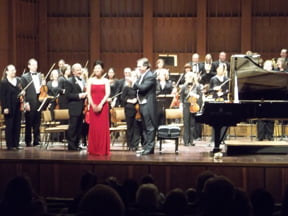By Ted AYALA
The fire and sparkle of Franz Liszt and the mellow sheen of Sergei Rachmaninoff swept over audiences last Saturday at Pasadena’s Ambassador Auditorium.
The Pasadena Symphony Orchestra (PSO), under the baton of guest conductor Maximiano Valdes, was joined by pianist Chu-Fang Huang in a concert that programmed Liszt’s Piano Concerto No. 2 and Rachmaninoff’s Symphony No. 2
Liszt’s piano concertos, while firm audience favorites, can be daunting for a soloist to successfully perform. Not only must a pianist contend with the taxing demands Liszt makes on the soloist, but they must also make music out of the various passages of filler with which his concertos – especially the Second – are held together. Cheek-by-jowl sit passages of the utmost musical brilliance and beauty with sections of vapid note-spinning and pomposity.
Chu-Fang Huang met Liszt’s virtuosic demands to the utmost with playing full of technical polish and sparkle. She was heard best in the work’s quieter moments, when passages of ornate filigree gleamed like strings of pearls from her fingers. However, it was in the concerto’s more bombastic moments when Huang stumbled. There was a sense of Huang playing outside of her comfort zone, of trying to push herself beyond button-downed expression, which was demonstrated in some distracting physical mannerisms in her playing. Huang’s playing, sensitive and intelligent though it was, was somewhat out-of-sync in Liszt’s hothouse atmosphere. In these concertos what is needed is a pianist who isn’t afraid to dirty their hands, jump in, and play the work to their very hilt. Liszt, though a much more erudite and sensible musician than his critics often give him credit for, knew well the power of entertaining his audience with spectacle. Not for nothing did love-struck ladies from Lisbon to Moscow swoon over the Magyar master, heaping piles of dainty undergarments and other such suggestive mementos in his wake. Much of Liszt’s music – especially these concertos – need to be played with total abandon, and even with a bit of campy fun. These are works that cry out not for sober musicality, but for glittering, rhinestone-studded, cape-flashing bravado determined to knock the audience out.
Huang delivered her utmost, but lacked that last bit of raw, animal energy and vigor needed to truly put her over the top and bring this concerto to life. She is undoubtedly a very fine pianist, but her playing, I feel, would be better served by playing the works of other composers. I would love to hear her in Schumann, Brahms, or Mendelssohn.

Rachmaninoff’s autumnal Symphony No. 2 followed after intermission in a warm reading under Valdes’ direction. Sculpting gorgeously bronzen sonorities from the PSO, Valdes stood back from the symphony, allowing Rachmaninoff to have his say unfettered by any outside intervention. Wave after wave of rich sound poured forth from the orchestra in an interpretation of the Rachmaninoff symphony free of wild eccentricities. One felt that the score itself was speaking directly to the audience.
The real heart of Valdes’ and the PSO’s playing was in the lush Adagio preceding the finale. Principal clarinetist Donald Foster, in the Adagio’s great clarinet solo, conjured a lithe and beautifully sculpted tone from his instrument that pulsated with ecstatic ardor. Here was playing that did full justice to Rachmaninoff’s ripe Romanticism, leaving the audience rapt in a spell that seemed to suspend time with every note drawn out.
As noted in earlier reviews, the PSO’s sound is better than ever. The orchestra’s wind soloists especially were outstanding in this closing concert of the PSO’s 2010-2011 season. The ovation it received when prompted by Maximiano Valdes to stand and receive the audience’s applause was much deserved.
The PSO has emerged this year as one of the region’s very finest orchestras, delivering imaginatively constructed programs under guest conductors of brilliance and deep musical insight. With next season several months away, I’ll be waiting until then with bated breath.
